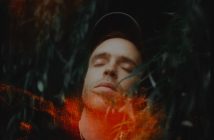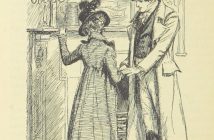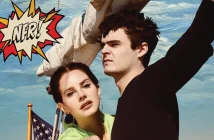It wouldn’t be difficult to argue that The 1975 are currently one of the most exciting bands in the country. With an emotive and conviction-filled approach to indie-pop the band have managed to achieve phenomenal success, garnering a number one début and a wondrously in-demand sell-out tour.
Here, frontman Matt Healy unveils his thought processes, insecurities and attitudes towards music, conveying the true passion, craftsmanship and belief behind The 1975.
You’ve pretty much had the best summer a band could ever ask for; so many incredible achievements and shows. However, first things first; the biggie. The album, “The 1975” in at number one; where were you when you first heard and what were your initial thoughts on finding out that your debut album had gone in at number one?
Matt: When we heard we were number one, to be honest with you it was weird because I thought finding out about the number one record would be like when I used to listen to the countdown; so I used to think I’d know nothing about it and then I’d listen to the countdown and we’d come in at number one.
It’s not quite like that because there’s a lot of mathematics involved. By the time our album came out we had done a joint venture with Universal; up until ‘Chocolate’ we did everything on our own indie label and then we signed a co-deal with Universal which meant we kept full creative control – everything was still from us but we had the platform of Universal to get t0 more people because they have a lot of money and they’ve got a lot of advertising space. Then, when it comes to the album, everyone’s talking about it; the week before everyone was going ‘you’ve sold x amount’.
Numbers bore me so much; I find it really, really difficult to even engage, even if it’s like ‘you’ve won £10 million’, I find it really boring. By the time we got to Sunday we kind of knew we were going to get number one so it wasn’t some sort of 90-minute win, like a goal in the 91st minute it was more like winning 2-0 on aggregate. We were at iTunes Festival and we spent the whole week thinking ‘fucking hell we’re gonna get a number one album’ and when it hit me I didn’t feel any different.
I had this big existential crisis; then I thought that those just aren’t the important things. Like statistical, material achievements, they’re actually quite brittle and they don’t really last – they don’t have much substance. What really has substance is the kind of human connection with somebody at your show; somebody tells you an amazing story about how your music has affected their life. That’s what this year has been defined by, for me.
In your interview with The Evening Standard you said that these landmarks you achieve take you further away from being genuinely happy. Do you perhaps fear that the more successful you become the less meaningful your music is to the people who hear it?
M: Maybe so, but the one thing I have realised is that – it sounds like a bit of a philosophy teacher thing to say, a bit of a kind of stoned student thing to say – what I’ve really realised is that there’s certain things that you have control over and certain things that you don’t. In my life now I don’t really have enough time to phone my mum, to see my girlfriend, to wash my clothes; if I spent loads of time worrying about stuff that I don’t have control over…
Once I’ve made a record and it’s the statement that I wanna make and it looks and it smells the way that I want it to do, that’s all I can do. Music and art is so subjective and that’s what’s amazing about it, and that’s what can make and break artists. And I think you could worry about it but I think all that really happens is that people say stupid shit; for example now people say stuff about Coldplay being boring. They’re not boring, they’re incredible. And I’m sure that you’ve heard it all before and it’s been around for a long time, but they’re fucking Coldplay and that’s what they do.
We wrote that album and then people embraced it and then we got to number one; we didn’t get embraced by people and then wrote an album thinking ‘fuck me, we need a number one album’. That was an album written way before anybody knew us, so I feel that my only creative responsibility is to just make whatever I do as good as possible. I can’t do anything else.
You played to a packed Festival Republic tent at Reading and then another crowd about three times the size of the tent trying to watch from outside. I know you said when you got the number one album it didn’t really feel so momentous, do you reckon that show was a real ‘we made it’ moment?
M: That was. We would stop and I would stare out in to the crowd and the cheer would die down, and then it would come back again after every song. We’d get a double cheer, it was like fucking homecoming, it was like everyone in that tent had all been away at war or something. It was like a celebration of everything that had happened.
Those two shows were the visual representation of how far our band has come. I used to stand at that festival, we’d never even played it, we’d never even walked into that festival as a band before and the first time we did it, it was those two shows. And it just blows your mind. It totally blows your fucking mind. It was before the album came out and they knew all the words off it, so it was just fucking mental, really humbling; that was a realisation moment. With other moments you don’t have a lot of time but in that moment they gave us twenty seconds in between each song to stand there and take it in.
You also played quite a few smaller festivals this year such as Y Not where you took a low slot subbing the second stage, and now you would be big enough to headline the whole thing. No one predicted how meteoric your rise was going to be, did it get strange playing under bands that were smaller than you?
M: No, it felt right, because they’re not smaller than us. It’s so weird for us to be an established band. To go from ten years of doing anything a certain way and then having that not only changed but reversed for eight months. We were playing above Dinosaur Jr. in Jersey, I went to see that band about six times only about five years ago. With Reading and Leeds we got booked by Festival Republic and we said ‘yeah we’re gonna do that slot, that’s the slot we want’ and then they came back to us and said ‘no, no your profile is too big you can’t do that slot’. They offered us third on main stage but we said ‘nah man’ because we don’t want to do those shows, we can’t get too big too quickly because it’s bullshit.
We didn’t want to do that so for us we weren’t playing with bands that were smaller than us, we were just aware that a lot of people were excited because we were so new and so fully formed. We became so many people’s favourite band so quickly and that’s because we’ve got so many songs, that’s the only reason. Because you can’t have a favourite band who’s got two songs because you look like a dickhead. If a new band comes out you can’t say they’re my favourite band because you sound like a numpty. If you’ve got a band that’s got four EPs that say something about who they are then they can be your favourite band.
What I think really sets you apart from other bands is that you have an experimental edge to your music. some of your tracks are really ambient/drone inspired whilst others are far more pop. Do you make a concerted effort to keep a balance between those two sides of your sound?
M: I think it’s a subconscious thing. We think of ourselves as having a scientific approach to pop music because we understand the way that pop music works. We understand how it works on an emotional level and on a technical level. One of the main taboos of the music industry is that they don’t like the idea of something creative not being divinely decreed. They don’t like the idea of it being learned, they only like the idea of someone being a genius.
And I say if you’ve got a job that requires you to sit at a computer all day it doesn’t necessarily mean it’ll make you a brilliant creative writer, but if you were that knowledge would fucking help, it would get things done ten times quicker and you’d really understand the language of what you’re talking.
I think what I’m saying is that the composite between alternative/ambient music and pop music is a subconscious thing and something we do naturally; it’s definitely a learned process, it’s definitely something which at one time we were experimenting with, combining and clashing them together. The first time is “The City”, the first demo of that had a drum loop; it was the first time we thought, right, we’re gonna produce our own band like dance music and then we’ve never looked back, and that’s how we do it.
Now another thing which I think is interesting is your band aesthetic; even from the original video to Sex and all of the EP artwork, there was already a very clear vision of how you wanted to present yourself. For me it conjures a noir-ish melancholy whilst maintaining this hazy youthfulness. I’ve read that you’re inspired by filmmaker John Hughes. How important would you say image is to you as a band?
M: Very important. It’s all kinds of little things that build us up and make us The 1975, not just the music – it’s the synergy between the aesthetic and the sound. It’s juxtaposed, it’s life affirming pop music with an aesthetic that is more dour and like you said kind of leans on noir aspects and is detached from reality. It’s all part of who we are, it’s an extension of our personalities. That means we don’t want to be so exposed, so the more you stylise something the less exposed you are as a person. My perfect song would sound like ‘I Wanna Dance with Somebody’ by Whitney Houston but would convey the message and have the conviction of ‘Hallelujah’ by Leonard Cohen. That would be my perfect song. I think it’s that juxtaposition of music that makes you feel really, really good at face value but also provokes you to be more introspective when you look in to it.
A lot of people of recent have been arguing that guitar and indie music is in ill health. How would you comment on the current state of guitar music?
M: I wouldn’t because I think it’s boring and I think it’s a problem that feeds itself. Because if everyone keeps thinking about music as being so defined and so tribal and so categorised then the subjectivity of it is kind of irrelevant. Everyone is like ‘what’s happening to guitar music’ – well it’s under evolution. And guitar music isn’t dead because two of the biggest selling records of the year have been by us and the fucking Arctic Monkeys. What do you want guitar music to be? If you call us a guitar band you might as well call us a microphone band because we use them, we use them more. If you woke up one morning and all genres were gone, you could look at your record collection in such a pure way, like unharboured by any weird connotations and it would be brilliant.
I mean a lot of people who complain about the state of guitar music will either complain that guitar music is boring or derivative but then when another band comes along those same sort of people will say that’s not ‘proper’ guitar music or that’s not how a guitar is supposed to sound. And then you wonder what they really want.
M: Well it’s like Manchester; the bands that everyone properly loves in Manchester, the reason they got big is because they were prided on being forward-thinking and they were changing a formula a little bit and it was interesting. But now they don’t want that, they want you to be the same as the first one; they’ve gone in the opposite direction. Now they want the same music, they have a retrogressive attitude. Everyone can fuck off, I can’t really be arsed with any of it to be honest.
The 1975 play O2 Academy Bournemouth on Friday 14th February; tickets are available here.



